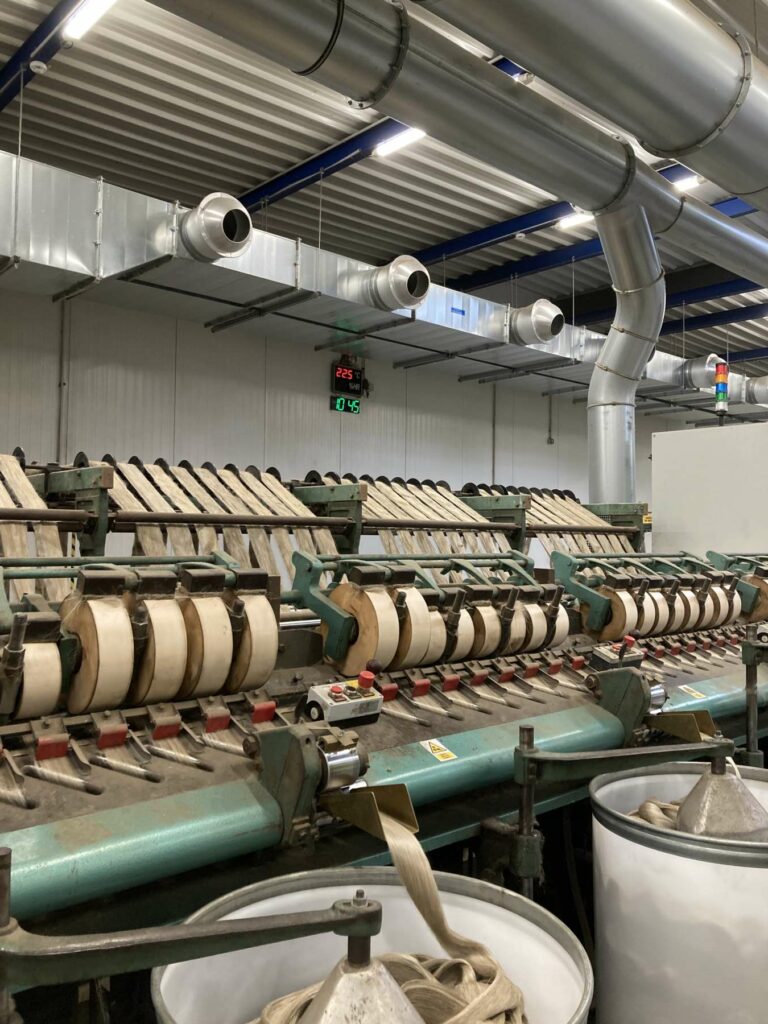In a context of profound transformation of industrial models and faced with the urgent need to reinvent a sustainable textile economy, the relocation of a french linen spinning mill in France is almost a founding act. It was in Béthune, in the heart of the historic flax-growing region, that Safilin chose to revive an age-old know-how, with a twofold objective : to promote French flax, an exceptional natural fibre, and to ensure that its production was resolutely local.
This revival didn’t happen on its own. It is the result of a unique dialogue and transfer of skills between Safilin’s Polish teams – who possess proven technical expertise – and the new French teams, trained with rigour and kindness. The Béthune spinning mill, more than an industrial site, embodies a collective dynamic, a meaningful project that combines excellence, tradition, innovation and industrial sovereignty.
Safilin: one name, two roots, one ambition
Founded in 1778, Safilin embodies over two centuries of commitment to natural fibres. Heir to a long textile tradition in the Lys valley, the company has preserved, passed on and adapted its know-how to the demands of the times. Although the closure of the French spinning mills in the 1990s forced Safilin to relocate its production units to Poland, this strategic decision enabled the company to maintain its expertise in flax spinning.
Today, strengthened by this European industrial presence and its stability, Safilin is making an ambitious return to its homeland. The Béthune spinning mill is more than just an industrial project: it represents a reconciliation between history and the future, between territory and know-how. It embodies the desire to ensure France’s textile sovereignty, while at the same time responding to a strong social demand for more ethical, more local, more responsible fashion.
Transferring know-how: exemplary Franco-Polish cooperation
One of the pillars of this relocation is undoubtedly the transfer of know-how. This relocation operation could not succeed without a precise, demanding and, above all, deeply human technical, methodological and cultural transfer. The Polish teams, with their decades of experience in flax spinning, played a fundamental role. By coming to Béthune, these employees became the living vectors of a meticulous technical tradition.
This transmission was not limited to simply passing on procedures. It was part of a long-term educational process, combining immersion, training and operational support. The French workers, who were sometimes neophytes, benefited from patient and rigorous supervision. Know-how was passed on not only through practical experience, but also through values such as attention to detail, high standards of quality and respect for the fibre.
This exchange has deeply enriched both teams. It revealed a collective intelligence in the service of a common objective: to make French linen a fibre of the future.
The Béthune spinning mill: a symbol of industrial renewal
The location of the spinning mill in Béthune is no small matter. Located in the Hauts-de-France region, at the heart of one of the world’s historic flax-producing areas, Béthune has a strong symbolic anchorage. The region, once a major centre of the textile industry, has seen its spinning mills and weaving looms disappear over the decades. By reintroducing this high
added-value activity, Safilin is offering a concrete response to a de-industrialisation that has long been seen as inevitable.
The spinning mill in Béthune is equipped with cutting-edge tools that are both robust and precise, enabling the fibre to be spun with respect. But more than the technology, it is the human and regional dimension of the project that is at its heart. The aim of this unit is not to mass-produce, but to produce just that: French flax yarn that is traceable and sustainable, destined for demanding brands and craftsmen.
This project is fully in line with the logic of local synergy, in close partnership with regional players. The bleaching of the flax fibre is entrusted to partners based in the Hauts-de-France region, thereby promoting local industrial know-how and reinforcing short circuits. The combing of the flax fibre is carried out by Terre de Lin, a major player in the agricultural cooperative sector in Normandy, guaranteeing high-quality processing. This network organisation means that we can reconstitute a complete, integrated supply chain that is deeply rooted in its local area. Through these collaborations, Safilin fully illustrates its commitment to a circular, local and resilient economy.
Shared values at the service of an exceptional fibre
Beyond the machines and processes, Safilin is built on a foundation of strong values : commitment, high standards, transparency and transmission. These values permeate every stage of production. They feed the relationships between employees and guide the
company’s strategic choices.
Transparency is at the heart of these values. In practical terms, this means total product traceability: from field to wire, every stage is identified, controlled and documented. This demand for clarity is a response to the growing expectations of brands and consumers. It also reinforces the credibility of the spinning mill and confidence in the French linen industry as a whole.
The company cultivates an ethical relationship with its materials. Linen, a noble and demanding fibre, demands respect and precision. Each yarn produced is the fruit of constant attention, rigorous technical mastery and a deep attachment to a job well done.
Humility, too, is part of Safilin’s DNA. It is in a spirit of cooperation that the teams move forward. The dialogue between Béthune and Poland is a perfect example. It’s not a question of juxtaposing two cultures, but of creating a common language, that of excellence.
French flax: a natural fibre with multiple benefits
At a time when synthetic materials still dominate the global textile industry, flax is establishing itself as a leading natural alternative. Grown without irrigation or GMOs and requiring few inputs, French flax is exemplary for its low environmental impact. It captures carbon, regenerates the soil and promotes biodiversity, while offering a resistant, breathable and elegant fabric.
Safilin has chosen to focus exclusively on natural fibres, with a clear preference for linen. This choice is not just technical or strategic: it is philosophical. Respect for the living world, control over resources and limiting the ecological footprint are all principles that guide the company’s decisions.
By producing top-quality flax yarn locally, Safilin is helping to raise the profile of this age-old fibre, while meeting today’s demands for more responsible consumption.
Relocation as a lever for the future of the industry
The relocation of the Béthune spinning mill is part of a wider movement to relocate industrial expertise in France. This choice, made with conviction by Safilin, is both an act of sovereignty and a response to the excesses of globalisation.
By repatriating production to France, Safilin is promoting the resilience of the textile industry, while creating local jobs, revitalising a regional industrial ecosystem and reducing transport-related emissions. This approach also allows for greater responsiveness, better control of lead times and a move upmarket in terms of quality.
This project gives new impetus to the entire French linen industry, from the farmer to the fashion designer, by restoring meaning, value and coherence at every stage. By focusing on collective intelligence, transnational cooperation and environmental responsibility, Safilin is demonstrating that the French textile industry not only has a past, but above all a future.
Weaving the future with solid roots
With the Béthune spinning mill, Safilin is reaffirming its desire to build a sustainable, local textile industry, anchored in its region and looking to the future. This project, the fruit of exemplary international cooperation, a deep-rooted attachment to French linen and high ethical standards, embodies an inspiring model.
By revitalising a spinning mill in France, training a new generation of workers and guaranteeing the traceability of each thread, Safilin is taking concrete action to promote a responsible industrial transition. More than a thread, it’s a link that weaves itself between people, territories and values.
Thanks to this virtuous dynamic, French linen is regaining its rightful place as a pillar of our heritage and a lever for our future.

